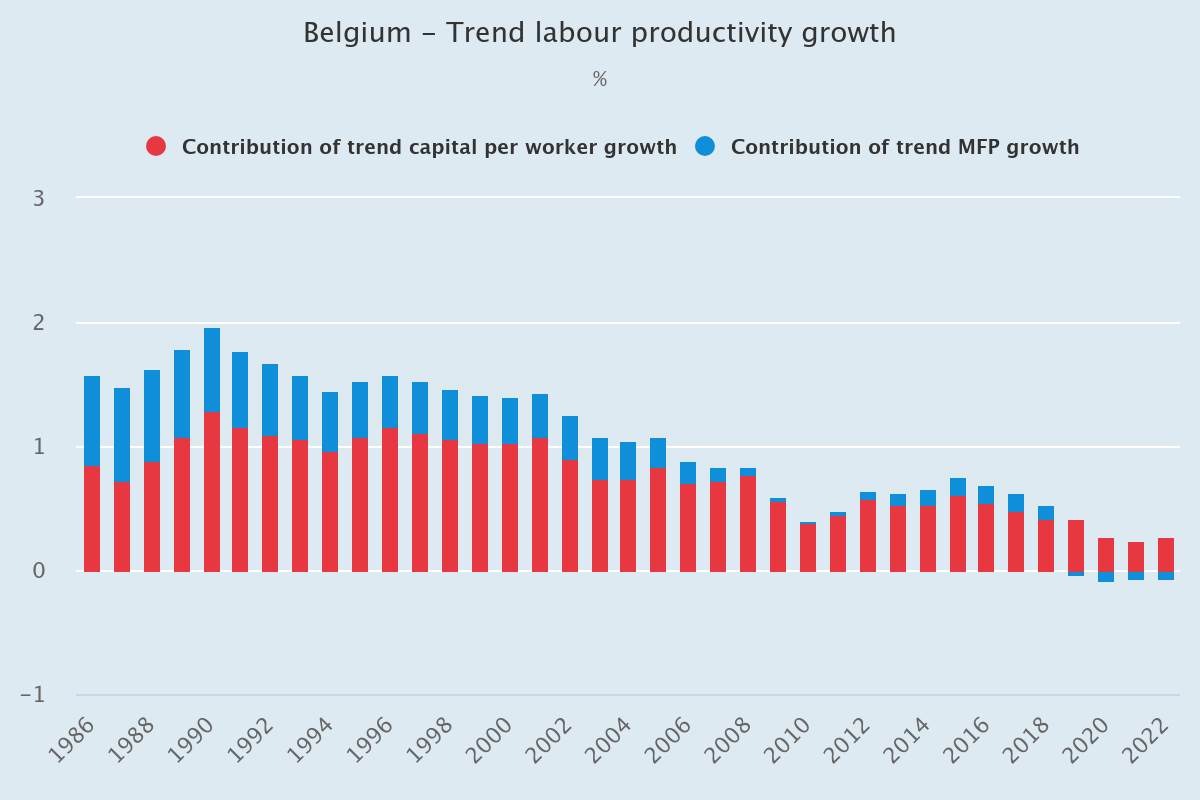National Productivity Board: officially installed on 14 May 2019. It is composed of twelve members, six at federal and six at regional level. The federal institutions (the Central Economic Council, the Federal Planning Bureau and the National Bank of Belgium) are each represented by two members. At the regional level, the Flemish, Brussels and Walloon region are each represented by two members.
Organisations
Selected Publications
National Productivity Board: Annual Reports (multiple);
Federal Planning Bureau: Use of Artificial Intelligence by companies in Belgium (2023), How strong does competition play in Belgian industries? (2023), Public Support to Business Research and Development in Belgium - Fourth evaluation (2022), Sources of labour productivity growth in Belgium (2021), Business dynamism and productivity growth in Belgium (2021), The most important R&D industries in Belgium - Structural evolutions and firm strategy (2020), Tax Incentives for Business R&D in Belgium: third evaluation (2019);
National Bank of Belgium: Productivity in the Face of Climate Change (2024), How did Belgian firms benefit from three decades of declining interest rates? (2023), With a little help from my friends: patents, technological diffusion and firm productivity (2022), Sourcing of services and total factor productivity (2022), Wage differentiation in Belgium: is there a role for productivity? (2022), Carbon emissions and the untapped potential of activity reallocation - Lessons from the EU ETS (2022), Lifelong learning for employees: investing in the future (2022), Belgian firms and the COVID-19 crisis (2021), The interplay between green policy, electricity prices, financial constraints and jobs – Firm-level evidence (2021), Tax incentives for R&D: are they effective? (2020), Belgium’s innovative capacity seen through the lens of patent data (2020), The distinct effects of information technologies and communication technologies on the age-skill composition of labour demand (2019), The origins of firm heterogeneity: A production network approach (2019);
Published academic papers: Unraveling Firms: Demand, Productivity and Markups Heterogeneity (2023), Workers’ tenure and firm productivity: New evidence from matched employer-employee panel data (2023), The productivity impact of R&D and FDI spillovers: characterising regional path development (2023), Productivity and wage effects of firm-level upstreamness: Evidence from Belgian linked panel data (2021);
OECD: OECD Economic Surveys: Belgium (multiple), Economic Policy Reforms 2023: Going for Growth – Belgium, The return on human (STEM) capital in Belgium (2021), The Future for Low-Educated Workers in Belgium (2020), In-depth Productivity Review of Belgium (2019), Productivity and wage effects of firm-level collective agreements: Evidence from Belgian linked panel data (2019), The productivity slowdown in Belgium: Main economy-wide and sectoral trends (2019).
Data

Note: Annual change of the ratio of potential real GDP per potential person employed.
Source: Calculation of the GFP based on OECD Economic Outlook data.
Access to further comparative data here.
Latest OECD Recommendations
Foster a competitive business environment by promoting digitalization and strengthen competition:
- Remove the barriers that can delay broadband network and 5G deployment, including strict limits on electromagnetic fields and slow delivery of permits.
- Prioritise providing the public sector with digital skills to better use and develop digital tools. Promote coherence of digital strategies across different levels of government.
- Facilitate consumer mobility across service providers.
- Continue to liberalise professional and craft services.
- Integrate regulatory impact assessments and ex-post evaluations of new regulations.
Ensure a competitive labour market:
- Encourage the use of existing mechanisms within the framework of sector-level agreements to better align wages with productivity at the firm level.
- Make the wage indexation mechanisms more flexible, while ensuring coordination if future evaluations find they fail to take into account the business cycle.
